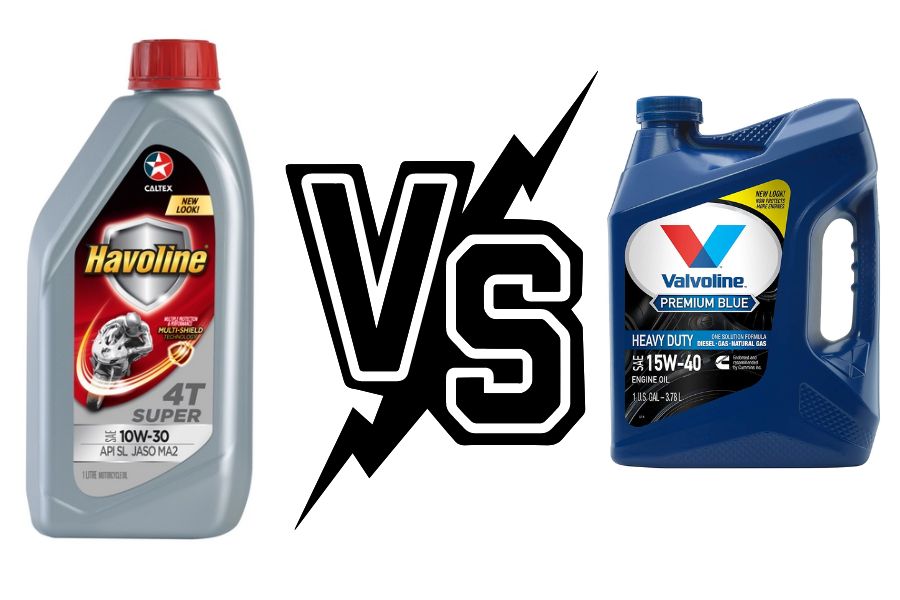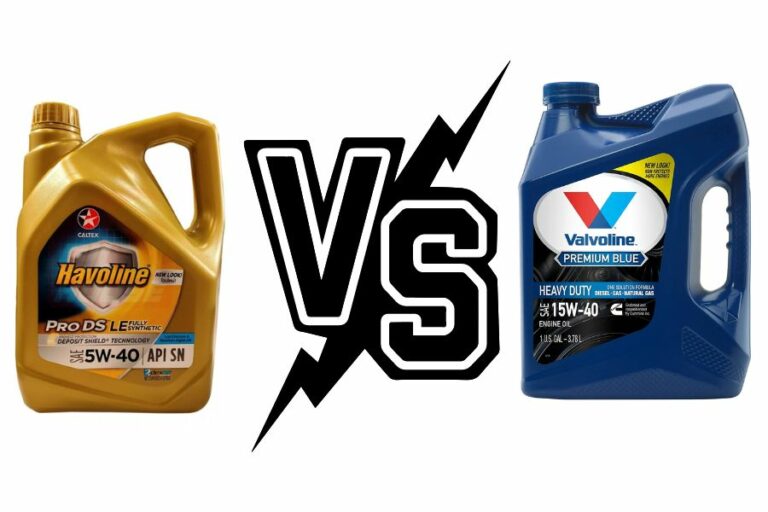15w40 vs 10w30 Motor Oil Comparison: 6 Major Difference
A wise motorist takes the time to research and purchase high-quality engine oil. This is because, as a car owner, if you are not careful enough to choose the right engine oil. You can’t make the most out of your car.
If you see 15w40 vs 10w30 they are the most popular motor oil types. However, what exactly distinguishes these two liquids from one another? What option should you choose?
An overview of the 15w40 Fluid
If you are not aware of what the 15w40 means, let us explain it to you first. Well, the 15w40 is usually the viscosity grade determined by SAE. Simply put, the fluid 15w40 refers to the oil viscosity (flow of resistance) in cold and hot temperatures.
Here, the first number indicates that the viscosity of the fluid 15w40 is 15 in cold weather and 40 in hot weather.
The 15w40 is regarded as a high-performing engine oil, especially suitable for diesel engines. Additionally, the 15w40 is often used with a heavy-duty engine, allowing the engine to run smoothly in hot and cold weather conditions.
It comes with essential additives to lubricate the engine’s parts; the fluid is always on the top priority list for many vehicle owners.
A viscosity grade of 15 in winter and 40 in warmer conditions make it even more efficient than other engine fluids.
The excellent soot dispersancy feature allows the fluid to ensure resistance against extreme wear and tear on the engine’s part.
However, there are some issues with the price, fuel economy, and stuff that we will never mind sharing after just a few moments.
Overview of the 10w30 Fluid
This is, undoubtedly, another most common type of engine fluid. As the viscosity grade is low, meaning the fluid tends to be thinner. And when the fluid comes with a lower viscosity grade, it works better in cold weather conditions.
At a time, putting the low viscosity of the engine fluid to the engine was a bit surprising. Let’s say 30-40 years back. As the automobile industry has become more advanced, there are hardly any issues regarding the low viscosity of engine oil.
So, like the 15w40, the engine fluid 10w30 can be another good choice for vehicle owners.
Here, the 10w30 fluid refers to the viscosity grade of 10 in cold weather, and 30 is the warmer weather condition.
But some automotive experts still believe that the 10w30 fluid needs additives to compensate for minimizing some weak points of the fluid 10w30. So let’s hope for the best. The ratio of 10 and 30 in winter and summer is not bad either.
Read Also: 5w40 vs 15w40: Which one ensures Longevity, Performance & Value
15w40 vs 10w30: Quick Comparison Table

Now it’s time to see the head-to-head difference between the two common types of engine oil. If you are confused about 15w40 vs 10w30 which engine fluid to choose, this section will help you.
| Comparison Factors | 15w40 | 10w30 |
| Viscosity | 15 in the cold weather and 40 in the hot weather. | 10 in the cold weather and 30 in the hot weather. |
| Resistance of flow | Thicker in the winter | Thinner in the winter |
| Suitable weather condition | Compatible with hot weather conditions | Compatible with cold weather conditions |
| Fuel Economy | Not so fuel efficient | Impressive for fuel economy |
| Application | Suitable for diesel engine (heavy duty) vehicles. | Suitable for gasoline engine vehicles. |
| Price | Comparatively higher price range | Comparatively lower price range |
What Are the Differences Between 15w40 and 10w30?
You have come to see the comparison table for 10w30 vs 15w40s. The discussion will make too much sense if we elaborate on the comparison factors below.
But before that, it is good to clarify that it won’t hurt your engine too much if you choose one instead of another. Yes, there will be a difference in performance that you can experience.
Viscosity Grades
This is the most visible difference between the two types of engine oils. If you look at the number, you will see the number before and after the word ‘W’ are not similar. And these numbers indicate the viscosity grades of the fuel.
In the case of the 15w40, the viscosity grade is 15 in winter and 40 in hot weather conditions.
On the other hand, in the case of the 10w30, the viscosity grade is 10 in winter and 30 in hot weather or high temperature.
You must have a precise idea regarding the viscosity grade of the engine oil.
And this is because if you follow the recommendation of your vehicle’s manufacturer (you should), this knowledge can help you. The 15w40 has a higher viscosity grade compared to the 10w30.
Read Also: Can I Use 5W30 Instead of 5W20? (Helpful Tips and Explanation)
Resistance Of Flow
15w40 is supposed to be thicker compared to 10w30. And the number or viscosity grades say it all. There are pros and cons of the engine fluid becoming thicker and thinner.
In some cases, the more viscous oil tends to lubricate the parts of the engine better than the engine fluid, which is thinner.
As the viscosity grade of the 15w40 is better in both low and high temperatures, it will work more efficiently to prevent wear and tear.
But this doesn’t mean the fluid 10w30 is not up to the mark. The fluid can also come in handy, flowing more smoothly and caring for your engine.
Suitable Weather Conditions
Here is where your all focus should be. When choosing the correct engine fluid for your vehicle, you must first determine the weather condition in which you tend to drive your car.
For example, if you live in comparatively low-temperature weather conditions or where there is winter, you can go with thin engine fluid, coming with a low viscosity grade.
This is because the thinner the engine fluid in winter, the better it can flow through the engine parts. Besides, the viscosity of the engine oil tends to become a bit thick in winter.
And in such cases, if you go for the thicker engine oil, it might not work against the corrosion and will create trouble at the time of the cold-start of your vehicle.
Now let’s see the other side of the coin. You need thick oil if you live where the temperature is so high. As you know, the thicker the engine oil in hot weather, the better in case lubricates the engine parts.
So according to the experts, it will be better to go with the 10w30 engine fluid in the winter.
And in hot weather conditions, nothing can be as good as the 15w40 engine fluid. Don’t you want to reduce the engine drag by choosing the correct engine fluid?
Read Also: 75w90 Vs. 75w140: Find The Best Bang For Your Buck
Fuel Economy
Do you overthink the fuel economy of your vehicle? You’re welcome; you are not only the vehicle owner on the planet. But did you know the engine oil viscosity grade impacts your vehicle’s fuel economy? If you know, skip this section.
The more viscosity grade an engine fluid comes with, the less impressive the fluid is in fuel economy. Now, on the other hand, the less viscosity grade engine oil comes with, the better fuel economy it can ensure,
To make it simple, comparatively, thinner engine oil tends to perform better in the ensuing fuel efficiency of vehicles.
But have you wondered why? Well, the thicker engine oil creates more resistance to the engine than the thinner engine.
And it makes all the sense that the more resistance the engine creates, the more fuel it can consume.
So, in this case, as the 10w30 tends to be thinner than the 15w40, it is supposed to be good for fuel economy as it can circulate more freely. And you know what it means! You can save a good number of dollars with the 10w30 fluid.
Application
This is as important as determining precisely what environment you tend to drive your vehicle.
Depending on the engine type of your car, the choice of engine fluid might vary. And in the case of the 10w30 vs 15w40, there is no exception.
First, let’s know about the 15w4o engine oil. We often notice this engine oil is used more in diesel engines than gasoline. And most heavy-duty vehicles come with a diesel engine.
So, it can be said that the engine fluid 15w40 can apply to high-performing cars with diesel engines.
On the other hand, the 10w30, due to low viscosity, is entirely compatible with the gasoline engine. But you can use the 10w30 on the diesel engine as well.
The fluid is commonly used in vehicles with gasoline engines. For example, if you own a passenger can or any other modern-day vehicle, the fluid 10w30 will be more suitable.
However, the 15w40 can be ideal for heavy-duty trucks, farm tractors, SUVs, etc.
At the same time, we highly recommend you follow your vehicle’s manufacturer’s guidelines when buying and putting the engine oil in it.
Whoever knows better than your car’s manufacturer regarding what engine fluid suits your vehicle best?
Read Also: 0w40 vs 5w40: Which Synthetic Oil is Better for Your Car?
Price
There is a slight difference between the price points of the 15w40 and the 10w30 engine oil.
You will find the second one more affordable than the 15w40, no matter what brand of engine fluid you buy. However, depending on the retailer, the price points might vary.
The engine oil 10w30 tends to be more affordable because fewer additives are used in this fluid than the 15w40.
Besides, if you compare the quality of the additives, you will find more high-quality additives with the 15w40 compared to the 10w30, which is why the 15w40 is a bit expensive.
Can I Use 15w40 Instead of 10w30 in Diesel Engines?
Using the 10w30 in the diesel engine is possible instead of the 15w40. However, as the 15w40 tends to come with more high-quality additives, you might sacrifice some engine performance if you go with the 10w30.
Besides that, the 10w30 engine fluid is not supposed to create any issues for your vehicle.
Many vehicle owners use the 10w30 engine fluid instead of the 15w40 engine fluid in their diesel engines.
However, according to the experts, it is recommended to take the engine fluid 10w30 as not a permanent solution for the diesel engine.
Instead, you can use it temporarily in cold weather. But you need to shift to the 15w40 when the temperature is high.
Read Also: 5w30 vs 5w40: Which is Better & Outforms Better?
Frequently Asked Questions
We were surprised to see how many queries on the internet regarding the 15w40 vs 10w30. And so, it is essential to answer some of the questions here. Let’s see!
Is Thinner or Thicker Motor Oil Better?
Both have pros and cons. The fluid type varies depending on the weather condition where you drive your vehicle. Thinner oil for cold weather and thicker oil for hot weather.
How Often Should You Change the Engine Oil?
Changing the engine fluid every 7,000-10,000 miles of use is always recommended. However, the oil-changing period will depend on the make and model of your vehicle and driving conditions.
Which Is Better, 15W or 20W?
If you have to drive your car in cold weather conditions, then the viscosity grade of 15 is suitable for a better cold start. A bit more hot weather conditions? You can go with 20w. Other than that, there’s no significant difference.
Can You Refill the Engine Oil on Your Own?
You can refill the engine oil independently with the expertise and required tools. Otherwise, it’s better to take assistance from the repair shop. Not putting engine oil in the wrong way is the best you can do.
Can I Use 15w40 in a 4-Stroke Engine?
You can definitely use the 15w40 in a 4-stroke engine. And this is one of the standard practices for 4-stroke engine owners to go with the 15w40. Mobil Super Moto™ 15W-40 is a burning example in this regard.
Final Thoughts
Once you know the 15w40 vs 10w30 Comparison, we hope you’ll be wise enough to choose the correct engine fluid for your vehicle.
Besides, never deny the recommendation of your vehicle’s manufacturers in this regard, and change the engine fluid on a daily basis.



![Allison 1000 Transmission Fluid Type And Capacity [An Absolute Know-All!]](https://carfluidpro.com/wp-content/uploads/Allison-1000-Transmission-Fluid-Type-768x512.jpg)



